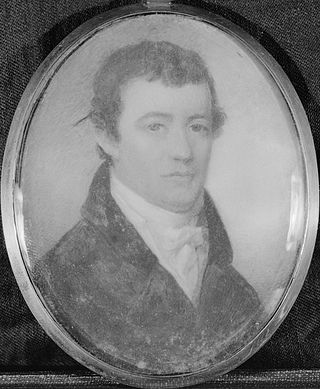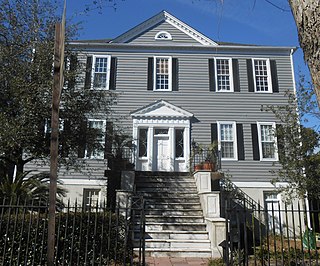Related Research Articles

Richard Hutson was a Founding Father of the United States and an American lawyer,judge,politician,and planter from Charleston,South Carolina. He was born in June 1747 to Rev. William Hutson and Mary Hutson. His family moved to Charleston in 1756 when his father was the pastor at the Circular Congregational Church. After having been educated in Charleston as a child,he attended Princeton.
The 66th (Berkshire) Regiment of Foot was an infantry regiment of the British Army,raised in 1756. Under the Childers Reforms it amalgamated with the 49th (Hertfordshire) Regiment of Foot to form the Princess Charlotte of Wales's in 1881.
Henry Laurens Pinckney was a U.S. Representative from South Carolina,and the son of Charles Pinckney and Mary Eleanor Laurens.
USS Herald was a full-rigged ship of about 270 tons burthen built in 1797 at Newburyport,Massachusetts. The US Navy purchased her on 15 June 1798,and sold her in 1801. She became the French 20-gun privateer corvette Africaine. In 1804 a British privateer seized her on 4 May 1804 off the coast,near Charleston,South Carolina. The seizure gave rise to a case in the U.S. courts that defined the limits of U.S. territorial waters. The U.S. courts ruled that the privateer had seized Africaine outside U.S. jurisdiction. Africaine then became a Liverpool-based slave ship that made two voyages carrying slaves from West Africa to the West Indies. After the abolition of the slave trade in 1807 she became a West Indiaman that two French privateers captured in late 1807 or early 1808.

General Sir David Dundas was a British Army officer who fought in the Seven Years' War and French Revolutionary Wars,wrote important texts on the Principles of Military Movements and then served as Commander-in-Chief of the Forces from 1809 to 1811.

Joseph Johnson (1776–1862) was the twenty-seventh mayor of Charleston,South Carolina,serving two terms from 1825 to 1827. He was re-elected to his second term on September 4,1826. He also was the president of the Branch Bank of the United States from 1818 until its close and authored a work titled "Traditions of South Carolina." Johnson died on October 6,1862,in Pineville,South Carolina and is buried at St. Philips Episcopal Church in Charleston. In his youth he operated the leading drug store in Charleston.
Benjamin Boyd was the seventeenth intendent (mayor) of Charleston,South Carolina,serving one term in 1808. He was elected on July 22,1808,to complete the term of John Dawson Jr.,who had resigned. Boyd was the shortest serving mayor of Charleston;a regular election was held on September 12,1808,at which his successor,William Rouse,was elected.
David Deas was the twelfth intendant of Charleston,South Carolina,serving from 1802 to 1803.

Charles Burnham Cochran was the fifteenth intendant (mayor) of Charleston,South Carolina,serving one term from 1805 to 1806. He was elected on September 9,1805. At the time,he lived at the house then-numbered 67 Meeting Street,Charleston,South Carolina. He had previously served as the federal marshal of the South Carolina District from 1795 to 1802. In 1806,he was elected treasurer of South Carolina for the lower division. Cochran died on August 21,1833.

Elias Horry was a lawyer,politician,businessman and plantation owner who twice served in the South Carolina General Assembly as well as the intendant (mayor) of Charleston,South Carolina,serving two terms from 1815 to 1817 and 1820 to 1821.

Daniel Stevens was the twenty-fourth intendant (mayor) of Charleston,South Carolina,serving from 1819 to 1820.

John Dawson Jr. was the sixteenth intendant (mayor) of Charleston,South Carolina,serving two terms from 1806 to 1808.

Thomas Rhett Smith was the twenty-first intendant (mayor) of Charleston,South Carolina,serving from 1813 to March 1815.

John Edwards (1760–1798) was the eighth intendant (mayor) of Charleston,South Carolina,serving two terms from 1795 to 1797.
John Bee Holmes was the seventh intendant (mayor) of Charleston,South Carolina,serving one term between 1794 and 1795.

Thomas Winstanley was the eighteenth intendant (mayor) of Charleston,South Carolina,serving one term between 1804 and 1805. He had been elected as a warden for Charleston on September 23,1801. On October 5,1803,he was elected intendant pro tem during the absence of the intendant.

James Reid Pringle was the thirtieth intendant (mayor) of Charleston,South Carolina,serving one term from 1830 to 1831.
Thomas H. McCalla was the nineteenth intendant (mayor) of Charleston,South Carolina,serving two consecutive terms from 1810 to 1812.
John Ward was the eleventh intendent (mayor) of Charleston,South Carolina,serving one term from 1801 to 1802.
Thomas Jones was the fifth intendent (mayor) of Charleston,South Carolina,serving one term from 1789 to 1790.
References
- ↑ "Regimental Orders". City Gazette and Daily Advertiser. Charleston, South Carolina. August 7, 1807. p. 1. Retrieved January 28, 2014.
- ↑ "Regimental Orders". City Gazette and Daily Advertiser. Charleston, South Carolina. July 9, 1808. p. 1. Retrieved January 28, 2014.
- ↑ "William Rouse, Esq. . . ". City Gazette and Daily Advertiser. Charleston, South Carolina. September 13, 1808. p. 3. Retrieved January 28, 2014.
- ↑ "William Rouse". Halsey Map Project. Preservation Society of Charleston. Retrieved January 28, 2014.
- ↑ "Colonel William Rouse . . ". The Carolina Gazette. Charleston, South Carolina. September 22, 1809. p. 3. Retrieved January 28, 2014.
- ↑ "Col William Rouse (1756-1829)". Cenotaph at St. Michael's Episcopal. Find a Grave. Retrieved January 28, 2014.